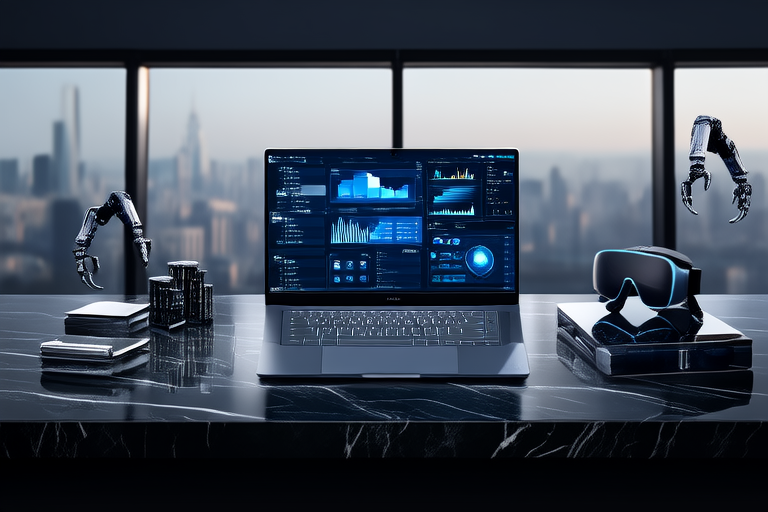From Healthcare to Finance: Exploring AI’s Impact Across Sectors
Introduction
Artificial Intelligence (AI) has emerged as a transformative force across various industries, reshaping the way businesses operate and interact with customers. This article aims to explore the profound impact of AI in sectors such as healthcare, finance, manufacturing, retail, and others. By examining specific applications and real-world examples, we will highlight how AI is driving innovation and efficiency in these fields.
Section 1: AI in Healthcare
In the healthcare sector, AI is playing a pivotal role in improving patient outcomes through personalized medicine, predictive analytics, and early disease detection. One of the most significant advancements is the use of AI in robotic surgery, which allows for more precise and less invasive procedures. For instance, Intuitive Surgical’s da Vinci system uses AI algorithms to assist surgeons in performing complex operations with greater accuracy.
Predictive analytics powered by AI is also transforming healthcare by enabling early identification of diseases before symptoms manifest. Companies like Tempus leverage machine learning to analyze vast amounts of clinical data, helping physicians make informed decisions about treatment plans. Additionally, AI-driven diagnostics tools, such as IBM Watson Health, assist in diagnosing conditions faster and more accurately than traditional methods.
Telemedicine represents another area where AI is making strides. Platforms like Teladoc and Amwell use AI to provide remote consultations, ensuring that patients receive timely care regardless of their location. These innovations not only enhance patient satisfaction but also reduce costs associated with hospital visits.
Section 2: AI in Finance
The financial services industry has seen significant changes due to the integration of AI technologies. Fraud detection systems powered by machine learning algorithms can identify suspicious transactions in real-time, thereby minimizing losses. Banks like JPMorgan Chase have implemented AI solutions to monitor millions of transactions daily, detecting anomalies that might indicate fraudulent activity.
Algorithmic trading, another application of AI in finance, enables high-frequency trading strategies based on complex mathematical models. Firms like Renaissance Technologies utilize sophisticated AI algorithms to execute trades at optimal times, maximizing returns while minimizing risks. Furthermore, AI-driven risk management tools help institutions assess potential threats more effectively, ensuring稳健的风险管理和投资决策。此外,AI驱动的风险管理工具帮助机构更有效地评估潜在威胁,确保稳健的风险管理和投资决策。
Customer service in banking has also benefited from AI through the introduction of chatbots and virtual assistants. These digital agents can handle routine inquiries, freeing up human representatives to focus on more complex issues. For example, Bank of America’s Erica, an AI-powered virtual assistant, assists customers with account management, bill payments, and financial advice. Similarly, Capital One’s Eno provides similar functionalities, enhancing user experience and operational efficiency.
Section 3: AI in Manufacturing
The manufacturing industry is embracing AI to optimize production processes, enhance supply chain management, and improve quality control. AI-driven predictive maintenance systems can anticipate equipment failures before they occur, reducing downtime and maintenance costs. General Electric’s Predix platform uses IoT sensors and machine learning to monitor industrial assets, providing actionable insights to operators.
Supply chain optimization is another area where AI is proving valuable. Companies like UPS employ AI algorithms to streamline logistics operations, optimizing delivery routes and reducing fuel consumption. This not only improves operational efficiency but also contributes to environmental sustainability.
Quality control in manufacturing has been enhanced by AI through the implementation of vision systems capable of detecting defects in real-time. Foxconn, one of the world’s largest electronics manufacturers, uses AI-powered inspection systems to ensure product quality, significantly lowering error rates and increasing productivity.
Section 4: AI in Retail
In the retail sector, AI is revolutionizing customer experiences through personalized recommendations, optimized inventory management, and advanced customer behavior analysis. Personalized recommendation engines, such as those used by Amazon and Netflix, suggest products tailored to individual preferences, boosting sales and customer loyalty.
Inventory management is another critical area where AI is making an impact. Walmart uses AI to predict demand patterns and adjust stock levels accordingly, minimizing overstocking and understocking issues. This ensures that popular items are always available, enhancing customer satisfaction.
Customer behavior analysis借助先进的数据分析技术,零售商可以深入了解顾客偏好和购买习惯,从而制定更有效的营销策略。此外,智能购物助手和虚拟试衣间等创新技术也为顾客提供了更加便捷和个性化的购物体验。例如,阿里巴巴旗下的淘宝和京东利用AI技术推出了虚拟试衣间功能,允许用户在线试穿服装,极大地提升了用户体验。
Section 5: AI in Other Sectors
Beyond healthcare, finance, manufacturing, and retail, AI is also finding applications in other sectors such as education, transportation, agriculture, and beyond. In education, AI-driven tutoring systems like Duolingo offer personalized language learning experiences, adapting content to each student’s pace and proficiency level.
The transportation sector benefits from AI through autonomous vehicles and smart traffic management systems. Companies like Waymo are developing self-driving cars that promise safer and more efficient travel options. Meanwhile, cities around the globe are implementing intelligent traffic systems to reduce congestion and improve road safety.
In agriculture, AI is being used to optimize crop yields and resource utilization. Farmers can use AI-powered drones to monitor field conditions and apply fertilizers precisely where needed, minimizing waste and maximizing output. This not only increases profitability but also promotes sustainable farming practices.
Across all these sectors, cross-industry collaboration plays a crucial role in accelerating AI adoption and fostering innovation. By sharing knowledge and resources, different industries can learn from each other’s successes and challenges, ultimately contributing to broader economic growth.
Conclusion
In conclusion, AI continues to demonstrate its transformative power across numerous sectors, from healthcare and finance to manufacturing and retail. Its ability to process large volumes of data quickly and accurately enables organizations to make better-informed decisions, leading to improved efficiency and competitiveness. As we look towards the future, it is clear that AI will play an increasingly important role in shaping our world. Encouraging responsible adoption and continuous improvement will be key to unlocking its full potential and ensuring that its benefits are shared widely.




